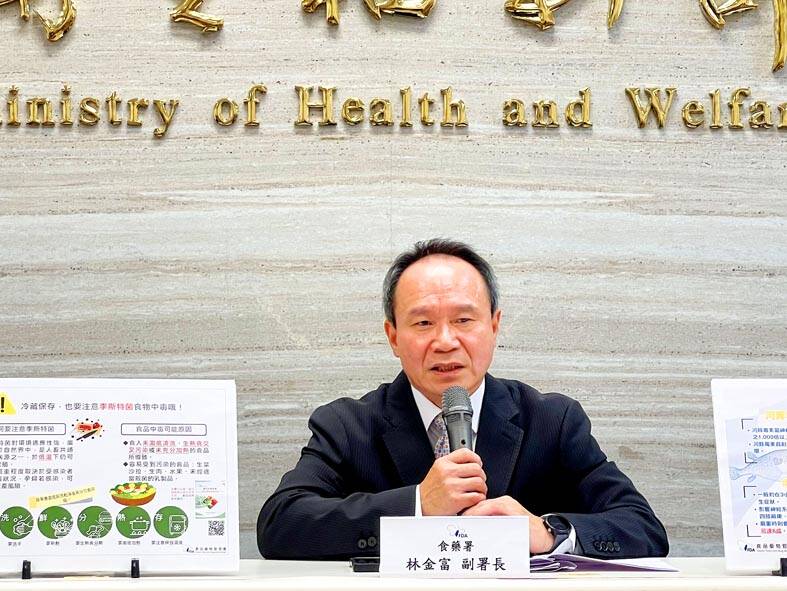Trace but legal levels of cesium-137, a radioactive isotope, were detected in a batch of mushroom powder imported from Japan’s Kumamoto Prefecture, the Food and Drug Administration (FDA) said yesterday.
FDA Deputy Director Lin Chin-fu (林金富) said cesium-137 was detected at a level of 10.6 becquerels per kilogram (Bq/kg) in a batch of mushroom powder that was sent for testing on Nov. 17.
Although that is considered a trace amount and within permitted limits, the FDA, in compliance with regulations passed by the legislature, gave the company importing the mushroom powder guidance on how to return or destroy it, but allowed the company to decide what to do with it, Lin said.

Photo: CNA
The maximum permitted levels for cesium-134 and cesium-137 combined are 10Bq/kg for beverages, 50Bq/kg for baby food and formula and 100Bq/kg for other food products.
From Jan. 1 to Dec. 3, five types of food products imported from Japan, including green tea powder, matcha powder, matsutake mushroom poweder and lingonberry extract, were found to contain trace but legal levels of cesium-137, FDA data showed.
After the Fukushima Dai-ichi nuclear power plant disaster in 2011, Taiwan banned imports from the Japanese prefectures of Fukushima, Tochigi, Gunma, Ibaraki and Chiba for 11 years due to radiation contamination fears.
On Feb. 21 last year, the blanket ban was replaced with a testing and certification system for imports from those locations, and the results are reported weekly by the FDA.

Several Chinese Nationalist Party (KMT) officials including Chairman Eric Chu (朱立倫) are to be summoned for questioning and then transferred to prosecutors for holding an illegal assembly in Taipei last night, the Taipei Police said today. Chu and two others hosted an illegal assembly and are to be requested to explain their actions, the Taipei City Police Department's Zhongzheng (中正) First Precinct said, referring to a protest held after Huang Lu Chin-ju (黃呂錦茹), KMT Taipei's chapter director, and several other KMT staffers were questioned for alleged signature forgery in recall petitions against Democratic Progressive Party (DPP) legislators. Taipei prosecutors had filed

Taiwan would welcome the return of Honduras as a diplomatic ally if its next president decides to make such a move, Minister of Foreign Affairs Lin Chia-lung (林佳龍) said yesterday. “Of course, we would welcome Honduras if they want to restore diplomatic ties with Taiwan after their elections,” Lin said at a meeting of the legislature’s Foreign Affairs and National Defense Committee, when asked to comment on statements made by two of the three Honduran presidential candidates during the presidential campaign in the Central American country. Taiwan is paying close attention to the region as a whole in the wake of a

NEW WORLD: Taiwan is pursuing innovative approaches to international relations through economics, trade and values-based diplomacy, the foreign minister said Taiwan would implement a “three-chain strategy” that promotes democratic values in response to US tariffs, Minister of Foreign Affairs Lin Chia-lung (林佳龍) said. Taiwan would aim to create a “global democratic value chain,” seek to capitalize on its position within the first island chain and promote a “non-red supply chain,” Lin was quoted as saying in the ministry’s written report to the Legislative Yuan submitted ahead of the legislature’s Foreign Affairs and National Defense Committee meeting slated for today. The Ministry would also uphold a spirit of mutual beneficial collaboration, maintaining close communication and consultations with Washington to show that Taiwan-US cooperation

President William Lai (賴清德) has appointed former vice president Chen Chien-jen (陳建仁) to attend the late Pope Francis’ funeral at the Vatican City on Saturday on his behalf, the Ministry of Foreign Affairs said today. The Holy See announced Francis’ funeral would take place on Saturday at 10am in St Peter’s Square. The ministry expressed condolences over Francis’ passing and said that Chen would represent Taiwan at the funeral and offer condolences in person. Taiwan and the Vatican have a long-standing and close diplomatic relationship, the ministry said. Both sides agreed to have Chen represent Taiwan at the funeral, given his Catholic identity and